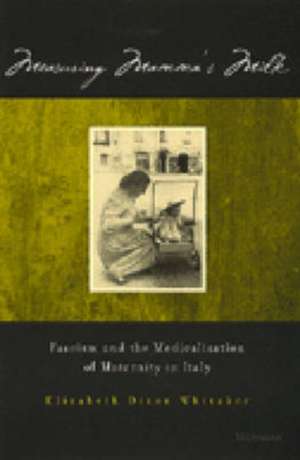Measuring Mamma's Milk: Fascism and the Medicalization of Maternity in Italy
Autor Elizabeth Dixon Whitakeren Limba Engleză Hardback – 8 iun 2000
In Italy as in other Western societies, the medicalization of basic biological functions contributes to the loss of personal confidence in the care of the body. Measuring Mamma's Milk analyzes the medicalization of maternity through a study of breastfeeding practices over a century of changes in socioeconomic organization, family life, and health beliefs.
During the pivotal interwar period in Italy, fascism changed the relationship between the state and the public and greatly tightened the state's ties with medicine and science. "Rationalized" breastfeeding was at the heart of programs to reduce infant mortality rates in order to increase the size and "quality" of the population. Highly regimented feeding schedules, still practiced today, came to represent both an eternal, natural function and the conquest of fatal maternal ignorance by modern science. They also had important consequences for fertility and for maternal and child health.
Through an interdisciplinary approach, Elizabeth Whitaker shows how fascism went beneath the surface to have a lasting impact on cultural beliefs and behaviors.
Measuring Mamma's Milk will appeal to readers interested in Italy, fascism, and the care of young children as well as to scholars in medical and cultural anthropology, European history, history of medicine, and women's studies.
Elizabeth Dixon Whitaker received her Ph.D. in anthropology from Emory University. She is the recipient of two Fulbright grants, the second of which sent her to the University of Bologna as a Senior Scholar in 1998-99. She is currently an independent scholar living in Washington, D.C.
During the pivotal interwar period in Italy, fascism changed the relationship between the state and the public and greatly tightened the state's ties with medicine and science. "Rationalized" breastfeeding was at the heart of programs to reduce infant mortality rates in order to increase the size and "quality" of the population. Highly regimented feeding schedules, still practiced today, came to represent both an eternal, natural function and the conquest of fatal maternal ignorance by modern science. They also had important consequences for fertility and for maternal and child health.
Through an interdisciplinary approach, Elizabeth Whitaker shows how fascism went beneath the surface to have a lasting impact on cultural beliefs and behaviors.
Measuring Mamma's Milk will appeal to readers interested in Italy, fascism, and the care of young children as well as to scholars in medical and cultural anthropology, European history, history of medicine, and women's studies.
Elizabeth Dixon Whitaker received her Ph.D. in anthropology from Emory University. She is the recipient of two Fulbright grants, the second of which sent her to the University of Bologna as a Senior Scholar in 1998-99. She is currently an independent scholar living in Washington, D.C.
Preț: 567.54 lei
Preț vechi: 700.67 lei
-19% Nou
Puncte Express: 851
Preț estimativ în valută:
108.60€ • 118.33$ • 91.51£
108.60€ • 118.33$ • 91.51£
Carte indisponibilă temporar
Doresc să fiu notificat când acest titlu va fi disponibil:
Se trimite...
Preluare comenzi: 021 569.72.76
Specificații
ISBN-13: 9780472110780
ISBN-10: 0472110780
Pagini: 368
Ilustrații: 4 drawings, 1 photograph, 8 tables
Dimensiuni: 152 x 229 x 30 mm
Greutate: 0.64 kg
Ediția:New.
Editura: UNIVERSITY OF MICHIGAN PRESS
Colecția University of Michigan Press
ISBN-10: 0472110780
Pagini: 368
Ilustrații: 4 drawings, 1 photograph, 8 tables
Dimensiuni: 152 x 229 x 30 mm
Greutate: 0.64 kg
Ediția:New.
Editura: UNIVERSITY OF MICHIGAN PRESS
Colecția University of Michigan Press
Notă biografică
Elizabeth Dixon Whitaker received her Ph.D. in anthropology from Emory University. She is the recipient of three Fulbright grants for research and teaching in Italy. She is an independent scholar who alternates between Emilia-Romagna, Italy and the central coast of California.
Recenzii
"Measuring Mamma’s Milk is a highly informative, thoughtful, and gracefully written book. It makes an important contribution to scholarship on 20th century Italy, medical anthropology, and women’s studies by showing how fascism shaped reproduction in enduring ways that have negative consequences for women and children.”
—American Anthropologist
"This is a remarkable text: imaginatively conceived, carefully and extensively researched, and by turns bold and passionate. …[It] deserves a wide readership – in cultural and medical anthropology, history of medicine, demography, European history, and women’s studies."
--- David Horn, Ohio State University
—American Anthropologist
"This is a remarkable text: imaginatively conceived, carefully and extensively researched, and by turns bold and passionate. …[It] deserves a wide readership – in cultural and medical anthropology, history of medicine, demography, European history, and women’s studies."
--- David Horn, Ohio State University
Descriere
Shows how fascist biological politics continue to govern the flow of mother's milk in Italy today
